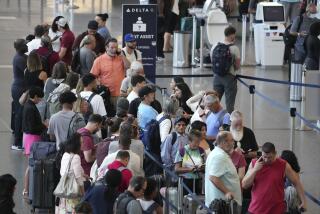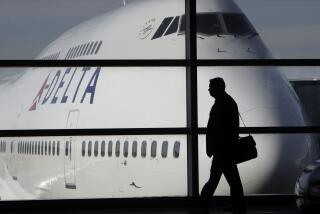Delta Discloses Threat Against All of Its Transatlantic Flights, Increases Security
- Share via
Delta Air Lines, in an unusual step, said Thursday it had received a telephone threat against all of its transatlantic flights.
The Atlanta-based airline said that it considered the threat a hoax. Nonetheless, it said that it had increased security on its European flights and will offer refunds to concerned ticket holders.
Delta spokeswoman Glenda Johnson said that the threat was received by a Delta sales office in Dublin, Ireland, and that no flight, city or date was given. Johnson would not say who made the threat or when it was received.
Aviation law experts said that Delta’s action was a response to liability questions raised by the bombing of Pan American World Airways Flight 103 over Lockerbie, Scotland, in December, 1988. Lawyers for the victims of the Pan Am disaster contend that the airline was negligent because it did not notify passengers that it had received terrorist threats.
Delta’s action Thursday came less than a week after Northwest Airlines disclosed a threat against its flight last Saturday from Paris to Detroit. More than 100 ticket holders canceled reservations on Northwest Flight 51, which landed without incident.
Experts expect such warnings to become more common in the wake of Lockerbie litigation. “The airlines have an obligation to warn passengers of a security threat,” said Steven Pounian, a New York lawyer who represents some families of the Lockerbie victims. “Providing a warning is the responsible thing to do.”
However, some experts said that if security warnings become routine, the traveling public might ignore them and face possible risk.
Delta said that it had notified police in Dublin of the threat and also told the Federal Aviation Administration. FAA spokesman Robert Buckhorn said the agency could not comment on any steps it is taking regarding the threat.
Buckhorn said airlines receive more than 350 threats a year and “the vast majority are hoaxes.”
The FBI confirmed that the FAA had notified it of the incident but declined to comment on its role in any investigation.
Delta is the eighth-largest transatlantic carrier, flying between six U.S. cities and Hamburg, Frankfurt, Munich and Stuttgart in Germany, London, Paris, Dublin and Shannon in Ireland.
Delta’s Johnson said that this is the first time the airline has disclosed a threat and that it is highly unlikely that it will disclose all future security threats. “Each threat is reviewed on a case-by-case basis to determine what to do,” she said. “In this case, we thought it was prudent to let the public know.” She would not say why Delta decided to treat this threat differently.
Besides making its announcement Thursday, Delta is notifying passengers of the threat as they arrive for transatlantic flights, Johnson said. She added that she did not know what policy the airline planned regarding its flight crews.
Bruce Hoffman, an expert on terrorism with the RAND Corp. in Santa Monica, Calif., said that the Delta threat was unusual because it was made by an anonymous caller and was not detected through intelligence channels. He said that it could have been inspired by publicity surrounding last week’s incident involving Northwest.
“There is a danger of a copy cat syndrome,” he said.
Consumer advocates praised Delta’s decision to warn passengers. “It is a healthy step in the right direction,” said Richard Livingston, chief executive with the Airline Passengers Assn. of North America, an advocacy group.
Livingston said it would not be good if airlines disclosed all the threats received. He said that passengers would probably be confused by an abundance of warnings and that massive flight cancellations would tie the air transportation system in knots.
“The terrorist would have achieved his goal because the system would be disrupted,” Livingston said.
However, he said a greater danger is that consumers would eventually tune out the warnings and not be alert to real danger posed by a valid threat. “I hope that the airlines screen these threats, determine which ones might be valid and make the information available to the consumer.”
More to Read
Inside the business of entertainment
The Wide Shot brings you news, analysis and insights on everything from streaming wars to production — and what it all means for the future.
You may occasionally receive promotional content from the Los Angeles Times.










